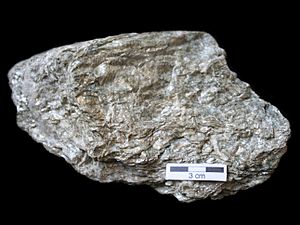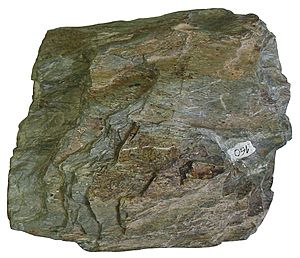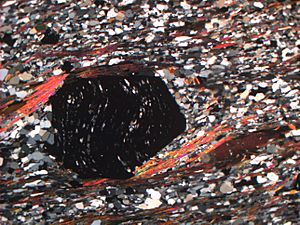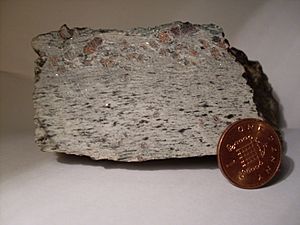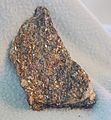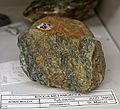Schist facts for kids
Schists are a group of metamorphic rocks. This means they are rocks that have changed over time due to intense heat and pressure deep inside the Earth. Schists are special because they have lots of flat, plate-like minerals, like mica (which looks shiny and flaky), chlorite, and talc.
You can often see the individual mineral pieces in schist with your own eyes. These minerals are squished and stretched into flat layers by the heat and pressure. This gives schist a layered look, almost like pages in a book. This layered quality is called foliation, and it means the rock can easily split into thin sheets or slabs. The word schist actually comes from the Greek word schíxein, which means "to split." This name fits perfectly because schists split easily along these mineral layers.
How Schists Form
Most schists start out as other rocks, like clays and muds. Over millions of years, these soft sediments get buried deep underground. The heat and pressure from the Earth's crust then transform them. First, they might become shales, then slates, and then phyllites, before finally turning into schists.
Some schists also form from fine-grained igneous rocks, which are rocks made from cooled lava or magma, like basalts. No matter their origin, schists are created when rocks are put under extreme conditions that change their structure and mineral makeup.
Types of Schists
There are many different kinds of schists, and they are usually named after the main minerals they contain. For example, if a schist has a lot of garnet minerals in it, it's called a garnet schist. Other common types include mica schists (which are the most common), graphite schists, and chlorite schists. You might also find tourmaline schist or glaucophane schist, depending on the minerals present.
Uses of Schists
Schists are often used as dimension stone. This means they are cut into specific shapes and sizes for building projects. Because they can be split into flat pieces, they are useful for things like paving stones, wall cladding, or decorative features in buildings. Their unique textures and colors can make them quite attractive for these purposes.
Images for kids
-
Manhattan schist from southeastern New York State
-
Manhattan schist outcropping in New York City's Central Park
-
Amphibole epidote schist with slickensides from Benguet, Philippines, showing epidote lens
See also
 In Spanish: Esquisto para niños
In Spanish: Esquisto para niños


